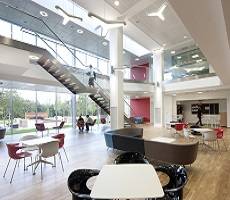January 16, 2014
Workplace is in a state of flux, with many more changes to come
Although we remain wary of predicting the workplace of the future, it is useful to discover what managers think is likely to happen, even if some of it is pretty obvious. In a new survey, HR decision-makers forecast the workforce of 2018 will look fundamentally different from that of 2013; including more workers opting to work part-time rather than retire (92%), managing an older workforce (88%), individuals maintaining and developing skill sets in multiple simultaneous careers (79%) and more than half of all workers being temporary / on contract or freelance (60%). A whopping 98 per cent of organisations have already experienced some kind of major organisational change over the last five years – the most common being restructuring (74%), a change in leadership (64%) and downsizing (64%). More →



























December 18, 2013
Companies need to work out what they want to emerge from the BYOD pile-up
by Mark Eltringham • Comment, Facilities management, Flexible working, Technology
More →